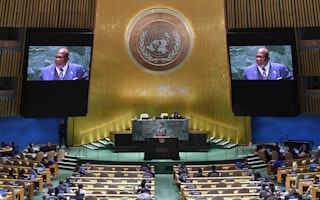NEW YORK—The Open Society Foundations welcome today’s launch by the International Monetary Fund (IMF) of a $650 billion infusion of liquidity into the global financial system, while urging further action to support global economic recovery from the COVID-19 pandemic.
The distribution of a new tranche of Special Drawing Rights (SDRs) to IMF members, agreed on August 2, was undertaken in part to assist “the most vulnerable countries struggling to cope with the impact of the COVID-19 crisis,” according to Kristalina Georgieva, the IMF’s managing director.
“This is an important step forward by the IMF,” said Julie McCarthy of the Open Society Foundations, who is leading the Foundations’ work on post-pandemic economic recovery. “But in order to address the most urgent pandemic needs it is absolutely vital that the richest countries in the world reassign their SDRs to help those most in need.”
The $650 billion allocation is also far short of the $2–3 trillion SDR allocation that economic justice advocates have been urging on the IMF.
Countries can use SDRs to increase government savings and fund programs or donate them to other countries.
Low-income and middle-income countries will receive a total of $230 billion of SDRs between them. But the G7 leading industrialized countries will receive more than $280 billion of the allocation.
The IMF has said it is up to member states to decide how much of the new SDRs should be reallocated to countries in need. Georgieva has argued that at least $100 billion should be reallocated to low-income countries.
“Together with other civil society groups and funders, we are urging a far bigger commitment to reallocation,” said McCarthy. “And this should also support middle-income countries where many of the world’s poorest live in precarious conditions that are particularly vulnerable to cuts in government spending that take away social safety nets.”
Open Society has pledged $10.8 million to a two-year funding and advocacy effort aimed at supporting a just and green recovery from the pandemic in low-income and middle-income countries.
Its objectives include a focus on ensuring that debt relief and additional financing support are used to support essential public services, such as healthcare and education, as well as climate mitigation, resiliency, and adaptation measures.
Read more
Economics of Equity
For a Just Recovery, Reform Sovereign Debt

As the global economy continues to reel from the COVID-19 pandemic, civil society groups have a rare chance to push policymakers toward bold reforms to free struggling nations from sovereign debt.
Meeting the Moment
Funding New Paths Toward Open Society—an Update

The Open Society Foundations have adopted new approaches to grant giving, aiming to deliver positive change in a rapidly evolving world.
Global Tax Justice
UN Moves Toward a Global Treaty on Tax

By endorsing a resolution to create a UN treaty on international tax cooperation, developing nations are pushing to address the inequities of a flawed system dominated by the economic interests of the world’s richest countries.